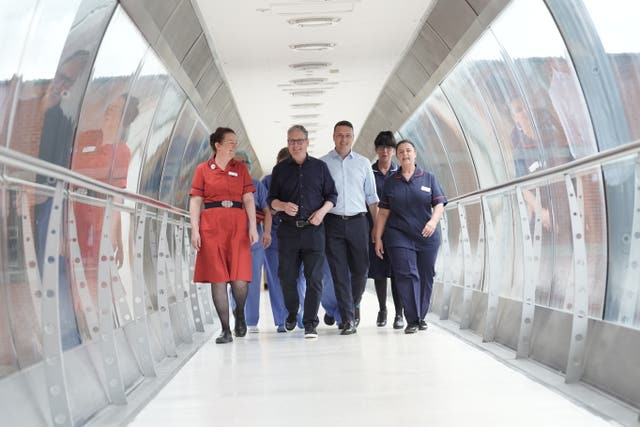Tories and Labour clash on tax as General Election battles intensify
The Tories are fighting on two fronts, trying to take on Labour on tax while clinging on to voters considering shifting to Reform UK.

The Tories and Labour have clashed over Sir Keir Starmer’s tax and spending plans as the General Election campaign became increasingly bitter.
Chancellor Jeremy Hunt claimed Sir Keir would turn the UK into what he dubbed “taxtopia” while Labour accused the Tories of being “desperate” and having “massive holes” in their own plans.
Meanwhile, opinion polls continued to heap pressure on Rishi Sunak and underlined why the Tories have shifted strategy to warn would-be Reform UK voters not to risk handing Labour a landslide win.
The Prime Minister revealed that his faith was helping him through the tough election campaign.
He told the Sunday Times: “In Hinduism, there’s a concept of duty called dharma, which is roughly translated as being about doing your duty and not having a focus on the outcomes of it.
“And you do (your duty) because it’s the right thing to do, and you have to detach yourself from the outcome of it.”
The Tory focus on tax came after Sir Keir Starmer ruled out imposing capital gains tax on the sale of family homes.
But the Conservatives have now demanded that he rules out a series of other potential tax measures which they claim would be needed to fill a “£38.5 billion black hole” in Labour’s plans.
Mr Hunt told the Sun on Sunday: “On tax, yes we put it up. But we started putting it down with four pence off national insurance.
“That’s a tax cut for working people and we want to go further in the next parliament.
“Compare that to taxtopia. Taxtopia is what we will get under a Labour government.”
“Specifically, by ruling out one type of tax on the family home, we know that if they refuse to do the same on a council tax raid, then they are planning to do it. It’s time for Keir Starmer to come clean with the British public,” she said.
The Tories have produced a list of 17 potential tax hikes Labour could make, but Sir Keir’s party said they would refuse to be drawn into the Conservative trap of responding to each claim.
“We are not going to spend the next two weeks responding to whatever fantasy plans the Tories are making up,” the spokesman said.
“They would be better off considering how they were meant to be the antidote to Liz Truss and ended up becoming nothing more than the latest instalment of her disastrous approach.”
Meanwhile, the very public Tory soul-searching about how to respond to a potential electoral defeat and the threat posed by Nigel Farage’s Reform UK has continued.
The Conservative strategy has been to warn would-be Reform voters that they risk denying Tories seats, which would result in a huge majority for Labour.
Former cabinet minister Robert Jenrick, a potential leadership contender, told the Sunday Telegraph: “A Labour Party with an elective dictatorship will be equally unrestrained on raising taxes.”
Mr Jenrick, who quit the Government because he believed the Rwanda legislation did not go far enough, added: “Some voters feel so angry with the Tories that a Labour landslide is a price they are willing to pay.
“Again, I sympathise with their frustrations and know that we must meet the British public’s expectations. That is the task I have dedicated myself to since resigning.”
Mr Farage predicted Tory divides would become more apparent, telling the Telegraph: “You will start to see those MPs, who I agree with on most things, start becoming much more vociferous about their stance as opposed to that of the party.

The scale of the challenge facing the Conservatives was underlined by two separate opinion polls.
Analysis and modelling by Survation put Labour on course to a 262-seat majority with the Tories reduced to a rump of just 72 MPs and Reform potentially picking up seven seats.
In its interpretation of the findings, Survation said: “Since Farage’s announcement to take over as leader of Reform UK, we’ve seen a rise in their vote share in national polling, and now we are seeing how this can result in seat gains.
“Unsurprisingly, Reform are making significant gains in places where the Conservatives are losing the most, and are currently the leading party by vote share in seven seats. Reform are also currently performing better than the Conservatives in 59 seats.”
Survation, who polled 42,269 people between May 31 and June 13, put the Liberal Democrats on 56 seats and the SNP on 37.
A voting intention poll by Savanta also contained bad news for Mr Sunak, with a warning the Tories could face “electoral extinction”.
The Savanta study for the Sunday Telegraph gave Labour a 25-point lead, with Sir Keir Starmer’s party on 46%, up two from last week, and the Tories on 21%, down four points.
Chris Hopkins, political research director at Savanta, said: “The hopes of Conservative candidates are being shot to pieces by poll after poll showing the Conservative Party in increasingly dire straits – and we’re only halfway through the campaign.”





